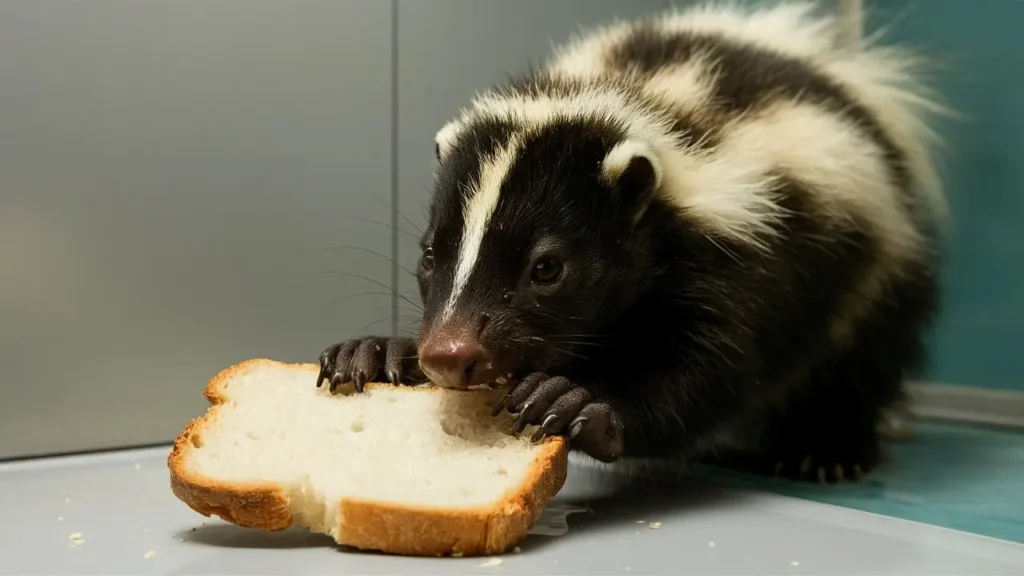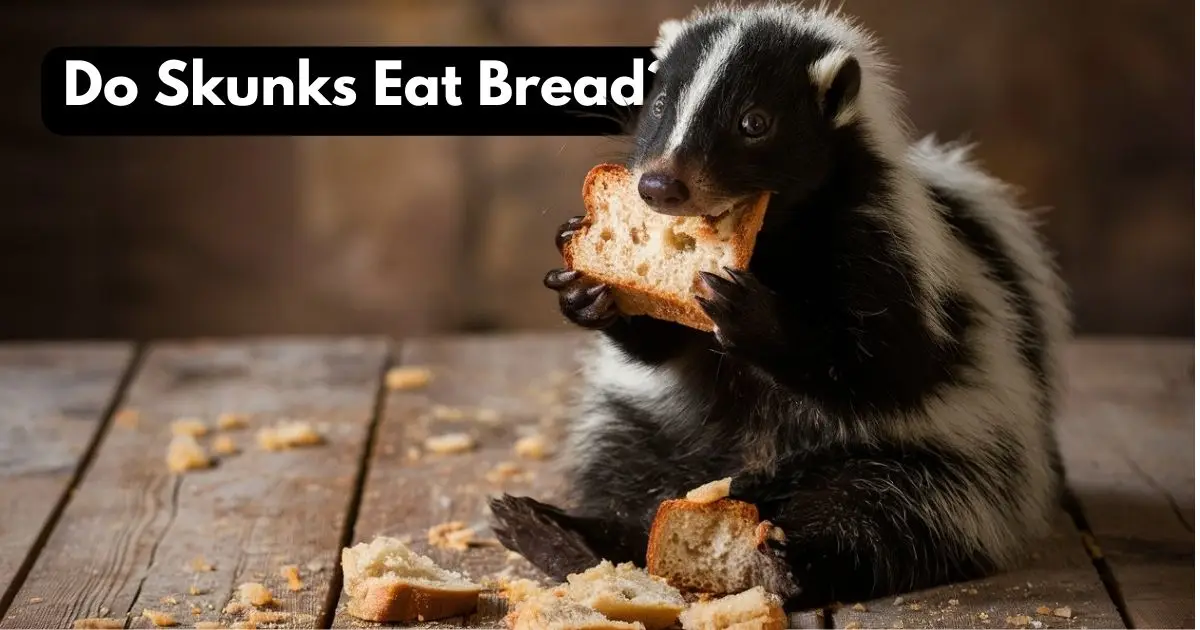Can Skunks Eat Bread? (Expert Answer)
Last updated on June 15th, 2025 at 03:48 am
Yes, skunks can eat bread—but that doesn’t mean they should. While a small amount of plain bread won’t harm them, it offers little nutritional value. Feeding skunks bread regularly can lead to poor health and unbalanced diets, especially for pet or backyard skunks.
As a wildlife expert with over 15 years of hands-on experience observing and caring for skunks, I’ve seen how human food—especially processed carbs like bread—can negatively affect their digestion and behavior.
Is Bread Safe for Skunks?
Let’s break it down:
| Type of Bread | Safe in Small Amounts? | Notes |
|---|---|---|
| White Bread | ✅ Yes | Low nutrition, okay occasionally |
| Whole Wheat | ✅ Yes | Slightly better but still not ideal |
| Moldy Bread | ❌ No | Can cause illness or death |
| Bread with Raisins, Garlic, Onion | ❌ No | Toxic to skunks |
| Toast with Butter or Jam | ❌ No | Too fatty and sugary |
🛑 Never feed moldy, sweetened, or seasoned bread to skunks.
🐾 Skunks are omnivores and need protein, fiber, and variety—not just starch.ames Don:
“Skunks are ecological cleaners. They help control pest populations like beetles and mice. In one tracking study I conducted in Arizona, over 70% of a skunk’s diet was made up of insects—bread wasn’t even on the radar.”

What Do Skunks Naturally Eat?
In the wild, skunks forage for:
- Insects (grubs, beetles, worms)
- Small mammals and bird eggs
- Fruits, berries, and nuts
- Roots and fungi
Their digestive systems aren’t built for processed human food. Occasional bread isn’t dangerous, but it shouldn’t replace their natural diet.
Bread As Skunk Bait?
Curiosity often leads to surprising discoveries, and wild animals like skunks are no exception. When you spot a skunk in your backyard, you might wonder, can this striped critter be lured away with something as simple as bread? It’s common to use food to attract or divert wildlife, and bread often emerges as an easy choice. But is it a wise one?
When Skunks Encounter Bread
Skunks possess a strong sense of smell. This trait draws them to various scents, including those of human foods. When they come across scraps of bread, it’s a potential snack. While not their natural prey, these opportunists might nibble on it out of curiosity. Below are some facts about skunks and bread:
- Skunks generally prefer insects and small rodents over bread.
- Bread offers a quick calorie boost to wandering skunks.
- Leftover or discarded bread can attract skunks into yards.
Skunks, being omnivores, can integrate a wide variety of foods into their diet, but should they?
Suitability Of Bread In Their Diet
Bread might seem harmless, but it’s not the best for skunks. The nutritional value of bread for skunks is minimal. These creatures thrive on a diet rich in protein and fat, which bread lacks significantly. Here’s why bread doesn’t fit their dietary needs:
| Nutrient | In Bread | Skunk’s Need |
|---|---|---|
| Protein | Low | High |
| Fat | Very Low | Medium |
| Fiber & Minerals | Low | High |
Supplementing a skunk’s diet with bread could lead to nutritional deficiencies. Occasionally, a skunk might enjoy bread, but it shouldn’t become a staple.
Bread can also pose a choking hazard to skunks and other wildlife. If left to decay, it can attract pests that may carry diseases. Therefore, while a slice might serve as bait, there are healthier and safer alternatives to consider.
Responsible feeding practices ensure that skunks and other wildlife stay healthy in their natural environments. For those who wish to observe or coexist with skunks, understanding their dietary needs is crucial.
🏡 Can I Feed Bread to a Backyard Skunk?
- 🧺 Plain bread only, and only once in a while
- 🚫 Avoid moldy, flavored, or buttery bread
- 🥚 🐛 Add healthy snacks like scrambled eggs, mealworms, or berries
✅ If you’re feeding a wild or backyard skunk, keep portions tiny and infrequent. A better treat? Cooked egg bits, unsalted chicken, or a few blueberries.
Pet Skunk Owner Tip
As a pet skunk owner, I learned the hard way: even a few days of poor diet shows up in their coat and energy. Stick to a vet-approved omnivore diet or commercial skunk food. Bread? Only as a rare treat.
Frequently Asked Questions
Do not feed skunks chocolate, caffeinated beverages, alcohol, processed junk food, or dairy products. Avoid offering nuts and pet food, which can lead to dependency and nutritional imbalances.
Skunks primarily feast on insects, grubs, and small rodents. They also enjoy eating fruits, nuts, and plants to supplement their diet.
Skunks are drawn to yards by food sources like garbage, pet food, and grubs. They’re also attracted to sheltered areas such as woodpiles and decks. Keep your space clean and secure to deter them.
Conclusion
Wrapping up, it’s clear that skunks may occasionally nibble on bread. Offering them healthier alternatives is wiser for their diet. Remember that wild animals thrive best on natural food sources. Responsible feeding practices benefit both skunks and our local ecosystems.
Enjoy observing skunks, keeping their well-being in mind.

